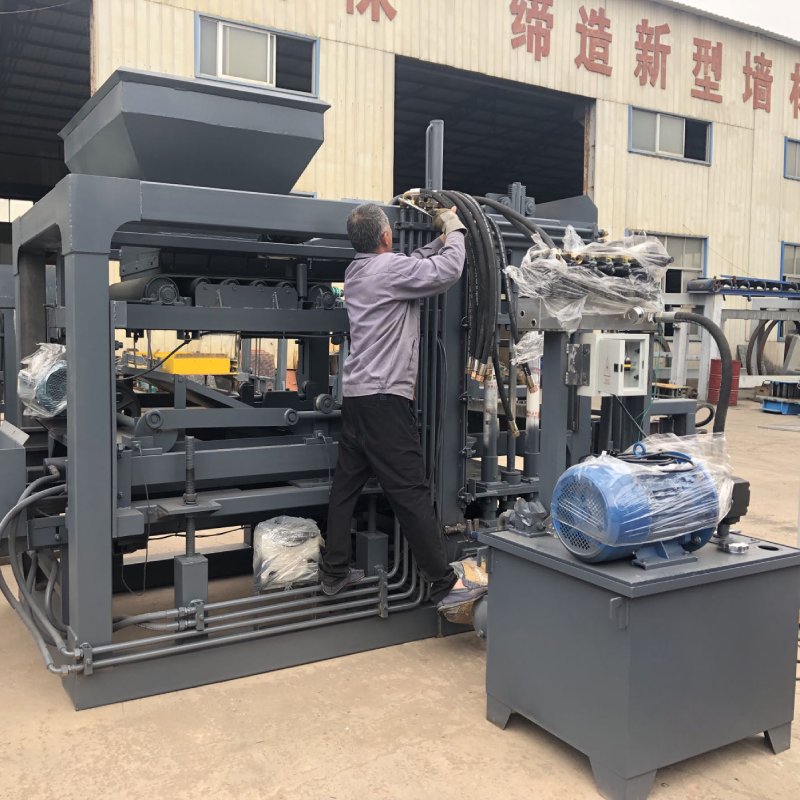
Image source Aiwei block machine
The Latest Advancements in Brick Block Making Machinery
The construction industry stands at the precipice of transformation, propelled by technological advancements that are revolutionizing traditional practices. One such pivotal innovation is the continuous evolution of brick block making machinery. In an era of sustainability, efficiency, and precision, these advancements are not just improving construction processes but reshaping the way we build our world. This article delves into the latest breakthroughs in brick block making machinery, exploring how they are enhancing construction practices, reducing environmental impact, and ultimately constructing a more sustainable future.
1. Automation and Precision: Traditionally, brick block making was a labor-intensive process, relying heavily on manual labor for tasks such as mixing, molding, and curing. However, recent advancements have ushered in a new era of automation and precision. State-of-the-art machinery incorporates computer-controlled systems that ensure consistency in the size, shape, and quality of the blocks. Automation not only reduces human error but also accelerates production rates, leading to significant time and cost savings. Modern machines utilize computer-aided design (CAD) software to create intricate molds and patterns, enabling the production of bricks with complex geometries and intricate designs.
2. Sustainable Materials and Practices: In response to the growing emphasis on sustainability, brick block making machinery has integrated eco-friendly practices and materials. Traditional clay bricks have been resource-intensive due to the extraction of clay and the high-energy consumption in firing kilns. However, the latest machinery is designed to work with alternative materials like fly ash, slag, and recycled aggregates. These materials not only reduce the demand for natural resources but also decrease the carbon footprint of construction projects. Additionally, the use of these materials often results in blocks with enhanced thermal and acoustic insulation properties, contributing to energy-efficient buildings.
3. Modular and Interlocking Designs: The emergence of modular and interlocking block designs has further transformed the construction landscape. These designs incorporate blocks that can be easily assembled and interlocked, eliminating the need for mortar. The machinery for producing such blocks has evolved to create precisely engineered units that fit seamlessly together. This advancement not only expedites construction but also enhances the structural integrity of buildings. Interlocking designs contribute to earthquake-resistant structures and can even be employed in temporary or emergency housing solutions.
4. Integration of Smart Technology: In the age of the Internet of Things (IoT), brick block making machinery has also witnessed the integration of smart technology. Machinery equipped with sensors and data analytics capabilities can monitor various parameters such as temperature, pressure, and vibration during the production process. This real-time data can be analyzed to optimize production efficiency and identify potential issues before they escalate. Furthermore, smart machinery allows for remote monitoring and control, enabling operators to make adjustments and troubleshoot from a distance, reducing downtime and increasing productivity.
5. Customization and Versatility: Modern brick block making machinery has shattered the limitations of standardized designs. Advanced machines are capable of producing blocks in a wide array of sizes, shapes, and colors. This level of customization empowers architects and builders to create unique and visually striking structures. Additionally, the machinery’s versatility extends beyond traditional bricks, enabling the production of pavers, decorative elements, and even textured blocks that mimic the appearance of natural stone.
6. Energy Efficiency and Waste Reduction: Energy efficiency has become a central focus in contemporary construction practices. Brick block making machinery has responded by incorporating energy-efficient components and processes. From optimized curing cycles to advanced heating mechanisms, these machines are designed to minimize energy consumption while maximizing output. Furthermore, the reduction of waste is a critical consideration. Advanced machinery often features systems that recycle excess materials, minimizing waste and promoting a circular economy within the construction industry.
7. Hybrid and Multifunctional Systems: To address the multifaceted demands of construction projects, brick block making machinery has evolved into hybrid and multifunctional systems. These machines are equipped with attachments and modules that enable additional processes beyond block production. From surface finishing to engraving, some machines can perform multiple tasks, reducing the need for separate equipment and streamlining operations on construction sites.
8. Improved Safety and Ergonomics: Advancements in brick block making machinery also extend to the realm of worker safety and ergonomics. Modern machines incorporate features that reduce physical strain and exposure to hazardous environments. Automation eliminates the need for workers to engage in repetitive and strenuous tasks, reducing the risk of injuries. Additionally, enhanced safety protocols, such as emergency stop mechanisms and protective barriers, ensure that the operation of these machines aligns with the highest safety standards.
9. Remote Training and Support: As brick block making machinery becomes more sophisticated, the need for skilled operators and technicians has grown. To bridge this skills gap, manufacturers have introduced remote training and support systems. These systems provide comprehensive training programs that can be accessed online, allowing operators to familiarize themselves with the machinery’s operation and maintenance. Remote support also enables experts to diagnose issues, provide guidance, and even perform virtual repairs, minimizing downtime.
10. Global Impact and Future Prospects: The latest advancements in brick block making machinery have global implications. As construction practices evolve, regions with housing deficits, limited resources, and vulnerable populations stand to benefit. From affordable housing solutions to disaster relief efforts, these innovations offer the potential to create safer, more sustainable, and resilient communities.
In conclusion, the latest advancements in brick block making machinery are reshaping the construction industry in profound ways. From automation and sustainability to smart technology and customization, these innovations are redefining how we build our world. As these technologies continue to mature and spread, they hold the promise of constructing not only physical structures but also a more sustainable and prosperous future for generations to come.
